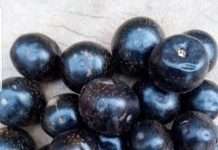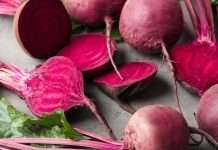
Justicia carnea (Fam. Acanthaceae), a flowering plant, is a tender perennial shrub that is widely cultivated in the tropics. It is popularly known by different names such as “blood of Jesus”, “Brazilian plume”, “flamingo flower” and “jacobinia”. It is called “ogwu obara” (medicine for blood) by the Igbos and “ewe eje” (blood leaf) or “ewe ajeri” (Jehovah’s Witness leaf) by the Yorubas.
Constituents
Proximate analysis from several studies showed the presence of flavonoids, terpenoides, saponins, phenols, alkaloids, steroids and tannins in J. carnea. Also present are minerals like magnesium, copper, iron, zinc and calcium; as well as vitamins A,C,E, B1, B2, B9, and B12.
Preparations
J.carnea may be available as the fresh leaves, dry leaves or dry leaf powder. The leaves may be squeezed raw, boiled or used to prepare soup, stew or other meals. They may also be used as infusions.
Pharmacological actions and medicinal uses
Reports from several countries reveal that J. carnea has the ability to increase the blood levels (blood builder). It therefore helps in an acute blood shortage, reduces blood sugar, alleviates gastrointestinal disorders, alleviates dizziness, relieves pain and alleviates fever. It is also said to be effective in the treatment of respiratory tract infection.
This flowering plant is used in traditional medicine, in various parts of Africa, for the treatment of anaemia, inflammation, fever, diarrhoea, liver diseases, arthritis, as well as respiratory and gastrointestinal disorder. Owing to its high blood-boosting ability, many Nigeria households drink it as tea every morning.
Results from researches carried out on mice and rats showed an increase in red blood cell count, and a decrease in the cholesterol levels. This implies that it is effective in treating iron-deficiency anaemia and other types of anaemic conditions like the ones associated with lipid abnormalities and more.
Results from other studies suggest that the extract of J. carnea leaf could be beneficial in elevating red blood cell, haemoglobin, packed cell volume and platelet count.
Studies have also identified some active metabolites that possess a lot of therapeutic properties, such as anti-microbial, anti-inflammatory, anti-diabetic, immune modulatory, and antimalarial activities that are of immense benefit to man. Thus, its usefulness in the management of rheumatoid arthritis, high temperature in fever patients, respiratory tract infections and high blood sugar.
A study suggested that methanolic extract of J. carnea may exhibit hepato-protective properties that may be effective in the management of liver toxicity. J. carnea is also said to possess anti-allergic, anti-tumour and anti-viral activities.
Adverse effects
Several studies report that J. carnea has no known toxic effect.
Economic uses and potentials
The plant is cultivated and sold as a decorative potted plant and is planted in landscaping, as a feature plant, in warm temperate and subtropical climates. J.carnea costs ₦1,000 per seedling. Dried Justicae carnea leaves are available for sale.
- carnea has great potentials in the pharmaceutical industry, for the production of supplements and drugs for the management of some chronic conditions. Opportunities lie in cultivation, sales, research, processing, production and packaging along the value chain of development and use of J. carnea as medicine.
References
Achumba S. (2023). Side effects, uses and health benefits of Ewe eje (Justicia carnea leaf). NIMED Health. Available at: https://nimedhealth.com.ng/2023/01/02/side-effects-uses-and-health-benefit-of-ewe-eje-justicia-carnea-leaf/. Accessed 18th April, 2024.
By Pharm. Ngozika Okoye MSc, MPH, FPCPharm
(Nigeria Natural Medicine Development Agency)
Email: ngozikaokoye@yahoo.com













